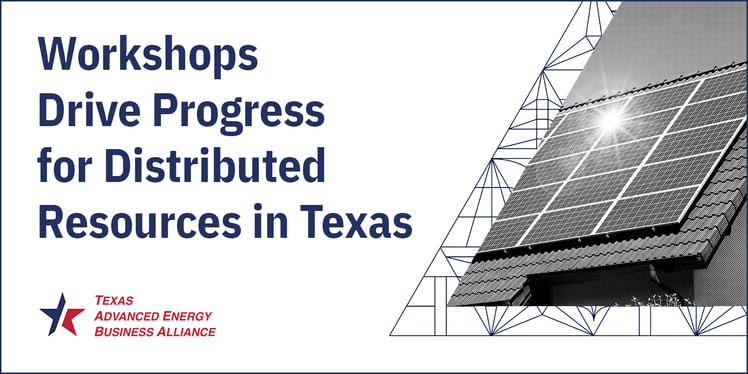 Texas’ demand for electricity breaks records year after year as the state battles extreme weather. Although Texas accounts for about 1/7th of the nation’s total energy consumption and uses more energy than any other state, demand for electricity keeps rising. Unlike traditional power plants that require years to become operational, distributed energy resources (DERs) are a readily available tool that Texas can use to meet this significant electricity demand.
Texas’ demand for electricity breaks records year after year as the state battles extreme weather. Although Texas accounts for about 1/7th of the nation’s total energy consumption and uses more energy than any other state, demand for electricity keeps rising. Unlike traditional power plants that require years to become operational, distributed energy resources (DERs) are a readily available tool that Texas can use to meet this significant electricity demand.
These resources are versatile and, under the right policy framework, can enhance reliability, resilience, and energy affordability. In a previous report, Future Proofing the Texas Grid with Distributed Energy Resources, we demonstrated the value of DERs and recommended that Texas take an intentional approach to supporting DER adoption. State regulators now have a tremendous opportunity to set standards for DER integration that could grow the role that these valuable resources play in firming up the Texas power grid.
Through a rulemaking process, the Public Utility Commission of Texas (PUCT) is working with stakeholders to revise regulations that govern the technical requirements and interconnection processes for DERs. However, almost 9 months after the initiation of that process, revisions to the rules are far from final. The most recent phase of this process, a series of workshops, indicates that defining important details for DER integration requires a more collaborative approach to balance the technical complexity of the subject with stakeholder perspectives and considerations.
Over the past two months, Texas Advanced Energy Business Alliance (TAEBA) has participated in three DER workshops hosted by the PUCT. These workshops represented an invaluable opportunity to connect with diverse stakeholders, ranging from utilities, consumer advocates, advanced energy businesses, and trade organizations, and to continue our advocacy for policies that support DER adoption in the state.
To guide our engagement in these workshops, we solicited input from members like Schneider Electric, Enchanted Rock, Convergent Energy and Power, Octopus Energy, Sunnova, Sunpower, CPower Energy Management, and Sunrun. These discussions aimed to answer the Commission’s questions about DER rules and requirements:
- Should utilities provide data on grid conditions to DER providers and other stakeholders? The Commission is weighing whether to require utilities to provide hosting capacity data, which represents the amount of DERs that can be accommodated by the distribution system without compromising reliability or requiring system upgrades. TAEBA supports requiring hosting capacity analysis reporting because this information can improve transparency into grid conditions, facilitate the strategic development of the distribution system and ensure practical placement of DERs.
- How can costs be fairly distributed among utilities and DER providers? TAEBA recommends that costs allocated to businesses be itemized to ensure fairness and transparency.
- Are interconnection processes and timelines practical and how should they be changed in light of incoming DER investment in Texas? TAEBA recommends that the Commission ensure that revisions to timelines result in the timely interconnection of DERs; and that, when possible, the Commission encourage collaboration between the DER provider and the utility. TAEBA further recommends that limitations be placed on the length of delays to ensure project progress.
- What technical and operational standards should DERs adhere to? TAEBA supports the use of standards representing best practices including UL 1741, which sets standards for DER equipment, and IEEE 1547 which establishes criteria and requirements for interconnection of DERs to the grid. Where appropriate, we support the removal of technical standards from the substantive rules for inclusion in ERCOT nodal protocols to ensure that standards can be readily updated. Timely updates to regulatory policies would facilitate DER adoption by reducing business uncertainty and encouraging adherence to best practices and standards.
Throughout the workshops, policy recommendations from DER providers converged on a few key themes:
- increase transparency into grid conditions;
- standardize requirements and processes throughout Texas, where feasible;
- increase transparency of costs charged to DER providers; and
- ensure timelines in the rule ensure timely processing and interconnection of DERs.
Investor-owned and municipally owned utilities were present at the workshops along with cooperatives. They communicated their positions, preferences, and limitations in regard to the proposed changes to substantive rules. Cooperatives and municipal utilities expressed a preference to not be included in any future regulations, however, in the final workshop, ERCOT recommended that the rules be applied to all entities. TAEBA supports this path forward on future rulemakings, as it would ensure clarity and predictability for DER developers no matter the utility territory in which their customers reside or do business.
These workshops represent a welcomed dialogue between regulated entities, energy businesses, and the Commission but there is more work to do. With the Aggregated Distributed Energy Resources (ADER) pilot project, the Energy Efficiency Implementation Project, and the work to implement directives from the Texas legislature, it is clear that the Commission will continue to rely on stakeholders to ensure consistency and compatibility between all the exciting energy work in Texas.